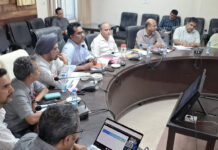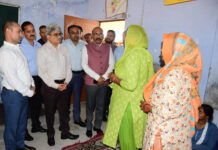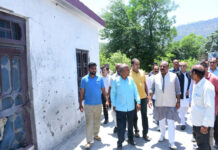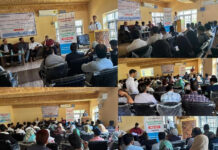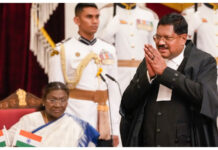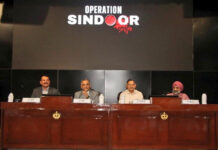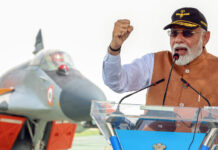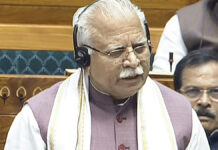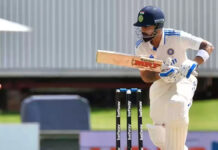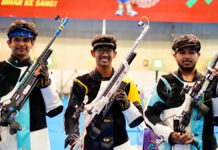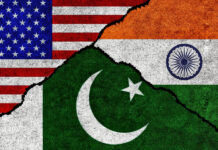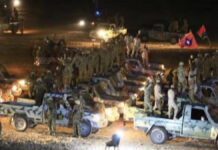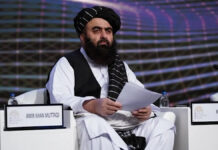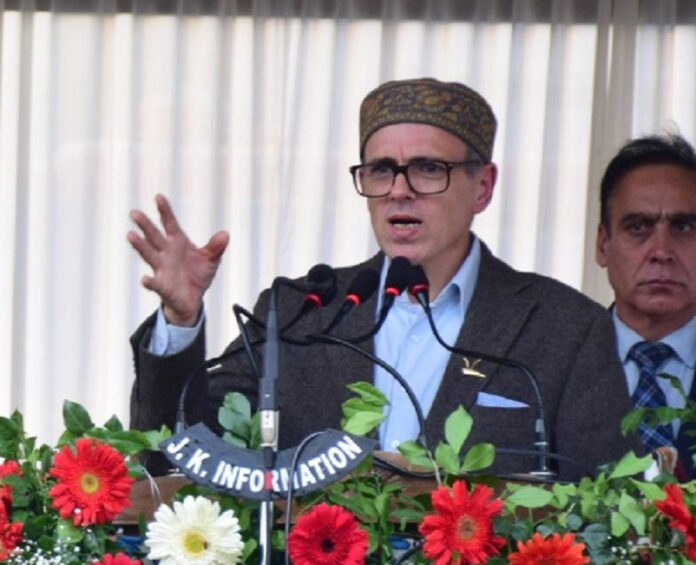DOGRA HERALD BUREAU
SRINAGAR, Jan 2
Jammu and Kashmir Chief Minister Omar Abdullah on Thursday said the hybrid model of governance in the Union territory is not to anyone’s advantage and the systems work better when there is single centre of command.
“Obviously, dual centres of power are not to anyone’s advantage. If dual centres were effective tools of governance, you would see it everywhere,” Abdullah told reporters at a media interaction here when asked about the hybrid model of governance in Jammu and Kashmir.
The chief minister said while there have been “differences of opinion on some issues”, there was no confrontation with the Raj Bhavan.
“Systems work better when there is single centre of command. For the UT, the dual centres of command are inbuilt. There have been differences of opinion on some issues, but not on the scale at which it is being speculated. Such reports are just a figment of imagination,” he added.
Abdullah said the business rules for the government would be framed after proper consultations and then sent to Lieutenant Governor Manoj Sinha.
The chief minister said that he was not the one to tell people not to go to the Raj Bhavan.
“I would say people should go wherever they can get their issues resolved — be it in the Raj Bhavan or with the local MLA or the officers,” he added.
Asked about his party MP Aga Syed Ruhullah Mehdi’s protest over the issue of reservation, Abdullah said the National Conference (NC) is a democracy and anyone has the right to speak.
“NC was often accused of being a family party. But we have always said that we are a democracy and everyone has a right to speak. Look at the positive side, how much change has come,” Abdullah said.
“From a time when protesting was considered illegal, people protested and reached my door. We had a meeting afterwards,” he added, referring to the anti-reservation protest near his residence in Gupkar which was joined by Mehdi.
As far as reservation is concerned, I told the delegates that the cabinet sub-committee has been framed, the chief minister said.
The party expected that Mehdi, the Lok Sabha MP from Srinagar, would hold a similar protest for the restoration of statehood in Parliament as well, he added.
Abdullah, however, said while we can fight the reserved and open category fight, “but first we have to save our jobs”.
“What will we do when people from other places come here for jobs?” he asked.
Responding to a question about the Raj Bhavan not restoring public holiday on NC founder Sheikh Mohammad Abdullah’s birthday on December 5, and July 13 as Martyr’s Day, the chief minister said it cannot erase the legacy of those who have made sacrifices.
“The legacy of Sheikh Mohammad Abdullah does not begin and end on December 5. Same goes with the martyrs of July 13. When a farmer tills his land, he thinks of Sheikh Mohammad Abdullah. When a student receives free or subsidized education, it is legacy of Sheikh Mohammad Abdullah. The hall where we are sitting right now was his legacy as well,” Abdullah said.
“The holidays became a big story. Ideally, we would want to have them as they are emotionally attached with people,” he added.
Asked about difficulties faced by the candidates on account of police verification for appointments in the government jobs, Abdullah said although it is outside his domain as of now, he has discussed the matter with the CID chief.
“I have been long saying this that a militant’s son is not a militant. Consciously, we did away with this blacklisting (in his first term as CM). We can only counsel about it right now. But I believe there is some relief. More will be done for them when we are a state,” he said.
Abdullah also said that his government was framing a policy to address the situation of hoteliers in Gulmarg whose land leases have expired after they had opted for now-disbanded Roshini scheme.
Responding to a question on the row over land acquisition for a campus of the National Institute of Technology (NIT) in south Kashmir’s Pulwama district, the chief minister said there is a need to find a balance between development and protecting our productive agriculture land.
“We cannot increase our land, development cannot stop. We will try to ensure that development projects are on non-productive lands as much as possible. I met a delegation from Pulwama and I said to them that if you don’t want NIT in Pulwama, we will take it to some other location,” Abdullah said.
“Not everyone is against development. There are other areas where we can locate this NIT. We will have to find a balance between development and protecting our productive agriculture land,” he added.
On the opposition’s allegation about a satellite colony being built, the chief minister said there is no such proposal on his table as he looks after the department.
“The people who are making most noise were the ones who talked about greater Jammu and Srinagar,” he said.
The chief minister said if the townships would be built, they will just for decongesting the Srinagar city.
“When we talk generally to the residents in Srinagar, they talk about decongestion. There is problem of housing. 3-4 families are living in a single house, they say if they get an opportunity they would move to suburbs,” Abdullah said.
“If the townships will be built, those will not be to settle the outsiders, but for the people of Srinagar, to decongest the city. But there is no such proposal or plan before the government yet,” he added.


